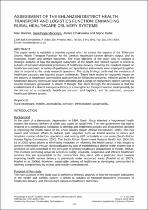 ResearchSpace
ResearchSpace
Assessment of the Ehlanzeni District health transport and logistics function: Enhancing rural healthcare delivery systems
JavaScript is disabled for your browser. Some features of this site may not work without it.
- ResearchSpace
- →
- Research Publications/Outputs
- →
- Conference Publications
- →
- View Item
| dc.contributor.author |
Mashiri, MAM

|
|
| dc.contributor.author |
Maponya, G

|
|
| dc.contributor.author |
Chakwizira, J

|
|
| dc.contributor.author |
Dube, S

|
|
| dc.date.accessioned | 2009-11-25T09:13:09Z | |
| dc.date.available | 2009-11-25T09:13:09Z | |
| dc.date.issued | 2009-07 | |
| dc.identifier.citation | Mashiri, MAM, Maponya, G, Chakwizira, J, Dube, S. 2009. Assessment of the Ehlanzeni District health transport and logistics function: Enhancing rural healthcare delivery systems. Sustainable Transport: 28th Southern African Transport Conference, Pretoria, South Africa, 6-9 July 2009, pp 10 | en |
| dc.identifier.isbn | 9781920017392 | |
| dc.identifier.uri | http://hdl.handle.net/10204/3777 | |
| dc.description | Sustainable Transport: 28th Southern African Transport Conference, Pretoria, South Africa, 6-9 July 2009 | en |
| dc.description.abstract | This paper seeks to establish a baseline against which to assess the impacts of the ‘Ehlanzeni District Health Transport Function’ for the district’s healthcare service delivery output, and by extension, health and welfare outcomes. The main objective of the study was to conduct a strategic analysis of how the transport subsystem of the health and welfare system is linked to subsets of transport-dependent processes of healthcare delivery including the resultant impact on healthcare outcomes. A variety of qualitative and quantitative instruments were employed to gather data to respond to the study research questions. The study findings confirmed the existence of healthcare transport and logistics supply bottlenecks. These have tended to negatively impact on the delivery of healthcare commodities and services for Ehlanzeni residents. Inflexion points in the healthcare delivery continuum have been identified and a range of intervention options serving as counter-measures generated. A strand of thought that filters through the discussion is that the establishment of a district transport authority or a strengthened transport function could possibly be the fulcrum of a sustainable healthcare transport and logistics, and by extension, pro-poor healthcare delivery system | en |
| dc.language.iso | en | en |
| dc.publisher | Souther African Transport Conference | en |
| dc.subject | Rural healthcare | en |
| dc.subject | Mobility | en |
| dc.subject | Accessibility | en |
| dc.subject | Transport | en |
| dc.subject | Infrastructure | en |
| dc.subject | Sustainability | en |
| dc.subject | Ehlanzeni district | en |
| dc.subject | Service delivery | en |
| dc.title | Assessment of the Ehlanzeni District health transport and logistics function: Enhancing rural healthcare delivery systems | en |
| dc.type | Conference Presentation | en |
| dc.identifier.apacitation | Mashiri, M., Maponya, G., Chakwizira, J., & Dube, S. (2009). Assessment of the Ehlanzeni District health transport and logistics function: Enhancing rural healthcare delivery systems. Souther African Transport Conference. http://hdl.handle.net/10204/3777 | en_ZA |
| dc.identifier.chicagocitation | Mashiri, MAM, G Maponya, J Chakwizira, and S Dube. "Assessment of the Ehlanzeni District health transport and logistics function: Enhancing rural healthcare delivery systems." (2009): http://hdl.handle.net/10204/3777 | en_ZA |
| dc.identifier.vancouvercitation | Mashiri M, Maponya G, Chakwizira J, Dube S, Assessment of the Ehlanzeni District health transport and logistics function: Enhancing rural healthcare delivery systems; Souther African Transport Conference; 2009. http://hdl.handle.net/10204/3777 . | en_ZA |
| dc.identifier.ris | TY - Conference Presentation AU - Mashiri, MAM AU - Maponya, G AU - Chakwizira, J AU - Dube, S AB - This paper seeks to establish a baseline against which to assess the impacts of the ‘Ehlanzeni District Health Transport Function’ for the district’s healthcare service delivery output, and by extension, health and welfare outcomes. The main objective of the study was to conduct a strategic analysis of how the transport subsystem of the health and welfare system is linked to subsets of transport-dependent processes of healthcare delivery including the resultant impact on healthcare outcomes. A variety of qualitative and quantitative instruments were employed to gather data to respond to the study research questions. The study findings confirmed the existence of healthcare transport and logistics supply bottlenecks. These have tended to negatively impact on the delivery of healthcare commodities and services for Ehlanzeni residents. Inflexion points in the healthcare delivery continuum have been identified and a range of intervention options serving as counter-measures generated. A strand of thought that filters through the discussion is that the establishment of a district transport authority or a strengthened transport function could possibly be the fulcrum of a sustainable healthcare transport and logistics, and by extension, pro-poor healthcare delivery system DA - 2009-07 DB - ResearchSpace DP - CSIR KW - Rural healthcare KW - Mobility KW - Accessibility KW - Transport KW - Infrastructure KW - Sustainability KW - Ehlanzeni district KW - Service delivery LK - https://researchspace.csir.co.za PY - 2009 SM - 9781920017392 T1 - Assessment of the Ehlanzeni District health transport and logistics function: Enhancing rural healthcare delivery systems TI - Assessment of the Ehlanzeni District health transport and logistics function: Enhancing rural healthcare delivery systems UR - http://hdl.handle.net/10204/3777 ER - | en_ZA |





